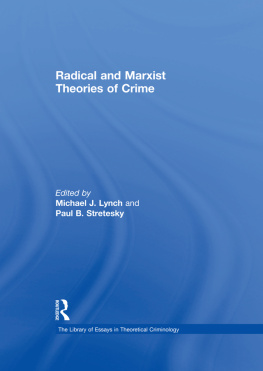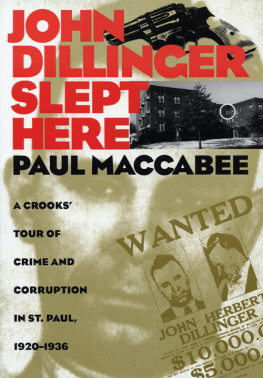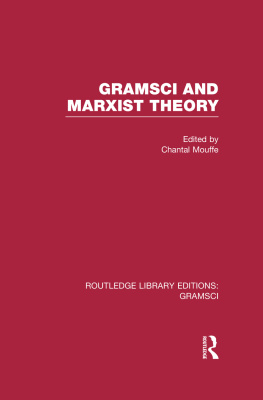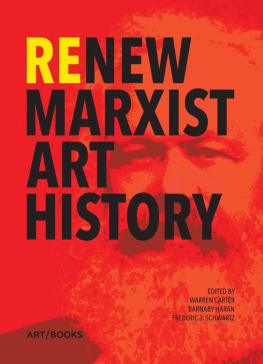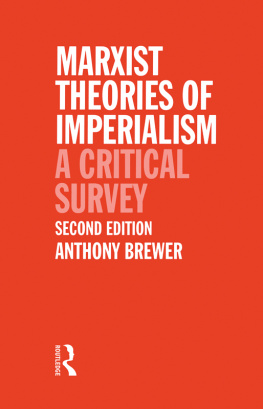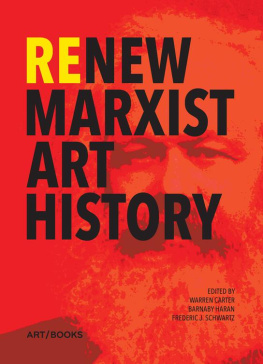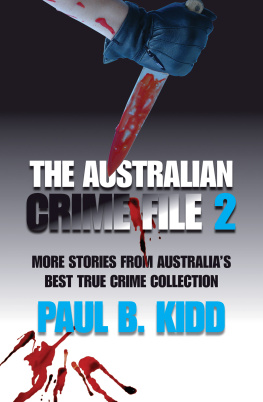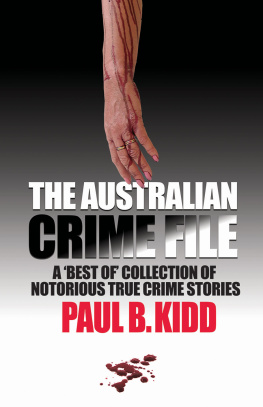Paul B. Stretesky - Radical and Marxist Theories of Crime
Here you can read online Paul B. Stretesky - Radical and Marxist Theories of Crime full text of the book (entire story) in english for free. Download pdf and epub, get meaning, cover and reviews about this ebook. year: 2011, publisher: Taylor & Francis, genre: Politics. Description of the work, (preface) as well as reviews are available. Best literature library LitArk.com created for fans of good reading and offers a wide selection of genres:
Romance novel
Science fiction
Adventure
Detective
Science
History
Home and family
Prose
Art
Politics
Computer
Non-fiction
Religion
Business
Children
Humor
Choose a favorite category and find really read worthwhile books. Enjoy immersion in the world of imagination, feel the emotions of the characters or learn something new for yourself, make an fascinating discovery.
- Book:Radical and Marxist Theories of Crime
- Author:
- Publisher:Taylor & Francis
- Genre:
- Year:2011
- Rating:3 / 5
- Favourites:Add to favourites
- Your mark:
- 60
- 1
- 2
- 3
- 4
- 5
Radical and Marxist Theories of Crime: summary, description and annotation
We offer to read an annotation, description, summary or preface (depends on what the author of the book "Radical and Marxist Theories of Crime" wrote himself). If you haven't found the necessary information about the book — write in the comments, we will try to find it.
Radical and Marxist Theories of Crime — read online for free the complete book (whole text) full work
Below is the text of the book, divided by pages. System saving the place of the last page read, allows you to conveniently read the book "Radical and Marxist Theories of Crime" online for free, without having to search again every time where you left off. Put a bookmark, and you can go to the page where you finished reading at any time.
Font size:
Interval:
Bookmark:
Series Editor: Stuart Henry
Robert Agnew and Joanne M. Kaufman
Ronald L. Akers, Christine S. Sellers and L. Thomas Winfree, Jr
Bruce A. Arrigo and Dragan Milovanovic
Kevin M. Beaver and Anthony Walsh
Meda Chesney-Lind and Merry Morash
Jeff Ferrell and Keith Hayward
Stuart Henry and Ross L. Matsueda
Michael J. Lynch and Paul B. Stretesky
Paul Mazerolle and Tara Renae McGee
Mangai Natarajan
Joseph H. Rankin and L. Edward Wells
Jeffery T. Walker
Michael J. Lynch
University of South Florida, USA
and
Paul B. Stretesky
University of Colorado, Denver, USA

2 Park Square, Milton Park, Abingdon, Oxon OX14 4RN
711 Third Avenue, New York, NY 10017, USA
Product or corporate names may be trademarks or registered trademarks, and are used only for identification and explanation without intent to infringe.
Radical and Marxist theories of crime. (The library of essays in theoretical criminology)
1. CrimeSociological aspects. 2. Critical criminology. 3. Philosophy, Marxist.
I. Series
364dc22
Font size:
Interval:
Bookmark:
Similar books «Radical and Marxist Theories of Crime»
Look at similar books to Radical and Marxist Theories of Crime. We have selected literature similar in name and meaning in the hope of providing readers with more options to find new, interesting, not yet read works.
Discussion, reviews of the book Radical and Marxist Theories of Crime and just readers' own opinions. Leave your comments, write what you think about the work, its meaning or the main characters. Specify what exactly you liked and what you didn't like, and why you think so.

